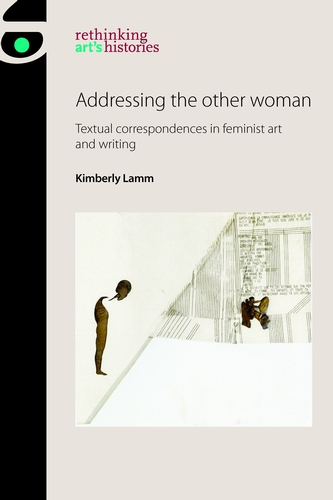
 What book in this field has inspired you the most?
What book in this field has inspired you the most?
Addressing the other woman is in dialogue with multiple fields– feminist art history, literature, and feminist theory—so there are a number of different books that have inspired me, but Griselda Pollock’s Vision and Difference: Femininity, Feminism, and Histories of Art was crucial to my thinking. Pollock’s chapter ‘Screening the Seventies: Sexuality and Representation in Feminist Practice—A Brechtian Perspective’ really opened up a lot of possibilities for me, as it highlights the strategies feminist artists deployed for interrupting visual images and engaging with viewers. I love her claim that artists engaged with images and language to ‘engage the social viewers to take up the position as the text’s imagined partner.’
Did your research take you to any unexpected places?
Absolutely. When I first conceptualized the project, I didn’t foresee that there would be so many stylistic similarities in the work of Adrian Piper and Angela Davis. That was really exciting to me. It showed that women who did not know each other were nevertheless ‘corresponding’ with each other across and through their work.
I also didn’t foresee making the claim that Nancy Spero’s and Mary Kelly’s use of language contributed to the anti-racist implications of their projects. This stood out in my analysis of Kelly’s Post-Partum Document. I argue that her choice to work with the materiality of language could be understood as a critique of white maternal femininity and the racism that haunts it. By showing how maternal femininity is a discursive position in language, Kelly’s Post-Partum Document denaturalizes the mother-child relationship and begins to unhinge motherhood from the project of being wholly responsible for children and the accompanying fears of ‘bad elements’ that are attached to racial difference in the post-colonial city.
What did you enjoy the most about writing your book?
I really liked the challenge of describing objects of art and literature with clarity and detail, and loved making the connections between the artwork and the writing.
What did you find hardest about writing your book?
Keeping it manageable; there are so many wonderful texts and ideas that can be brought to bear on the artists and writers I focus on; I found it challenging to reign in my archive!
Is this your first published book, or have you had others published?
This is my first published book. I want to publish more soon!
How did you feel when you saw your first published book?
Really pleased. I love the cover: it features an image from Nancy Spero’s Codex Artaud that is delightfully ambiguous and strange.
Why did you choose to publish with MUP?
Early on, Emma Brennan saw the value of reading women artists and writers together—I found her capacious understanding of the project very encouraging.
I really admire the work of Amelia Jones and Marsha Meskimmon and am very proud to have my book published in the ‘Rethinking Art’s Histories’ series.
Did you approach writing this book differently to any of your previous work?
I thought a lot about taking readers through a process and an experience—more than I ever have before. I tried to think of readers at every step of the writing.
Have you had time to think about your next research project yet? What are you working on now?
I am working on a book that is a development of Addressing the other woman. Tentatively titled Inheriting Letters of Exile, it looks at the artwork of Theresa Hak Kyung Cha, Mona Hatoum, and Lorna Simpson in relationship to the work of Gayatri Chakravorty Spivak and the reading practices she sets forth in ‘Can the Subaltern Speak?’ Cha, Hatoum, and Simpson all engage with the textual dimensions of language, so this book will take my interest in art and language further and will allow me to go deeper into questions of race, gender, and nation.
Addressing the other woman: Textual correspondences in feminist art and writing is available to buy now! You can read a sample chapter or request an inspection or review copy.
